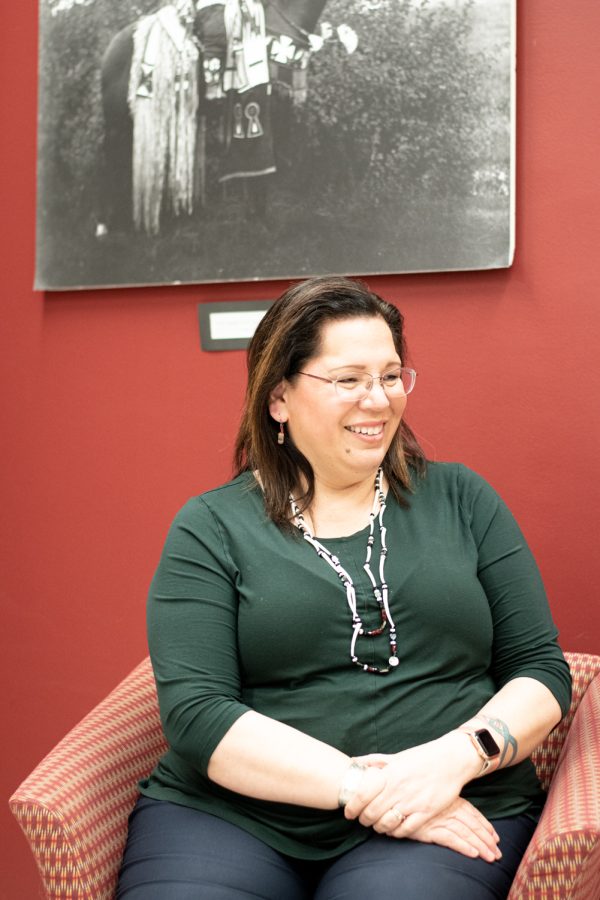WSU offers new scholarships for incoming Native American students
CAHNRS brings diverse perspectives to relevant career paths, provides tangible resources for students
Sharon Mail Kanichy (Makah Tribe), assistant director of Tribal Relations and Recruitment, discusses how Native American students in CAHNRS will be able to apply their degrees toward helping their tribe with the assistance of next year’s scholarships on Feb. 14.
February 18, 2022
The College of Agricultural, Human, and Natural Resource Sciences will offer new scholarships for incoming Native American students next year, providing tangible support for students to achieve their goal of higher education.
Elizabeth Perez, CAHNRS director of recruitment and retention, said the program will hopefully be the first step in supporting more Native American students throughout their college experience and into promising careers after graduation. She said the scholarships focus on recruiting students to gain more diverse perspectives in fields that are relevant to current issues.
“[CAHNRS is] going to require people from diverse populations who can bring varied perspectives to the table,” Perez said. “Our programs are tackling enormous issues of great importance to humans, animals and plants — to the future of our world. You’ve got to have that diversity, and I think it only improves the learning experience for everybody involved.”
Students from all WSU campuses who are incoming freshmen, transfers or undecided in their major are eligible for the scholarships. They must also be admitted to WSU and complete the General Scholarship Application.
Perez said students can find more information on the Native American Programs website by the end of this week and, in the meantime, may contact Perez or Sharon Mail Kanichy (Makah Tribe), assistant director of Tribal Relations and Recruitment, for further details.
The scholarships are funded by a $50,000 gift from Northwest Farm Credit Services, according to WSU Insider. Community members can also donate to the scholarship funds at the WSU Foundation website.
Kanichy said each of the 12 tribes in WSU’s Memorandum of Understanding are dedicated to providing their students with higher education, but they still face financial barriers that vary from one tribe to another.
She said providing better access to CAHNRS degrees allows Native American students to apply the valuable skills they learned and assist their tribe with economic and environmental issues.
Breaking the barriers between Native American students and their access to financial aid is a mission that Kanichy takes seriously because of her family history, she said.
Her grandmother was an educator, inspiring Kanichy’s 14-year-long career as a teacher on the Makah Reservation. She said her great-grandmother was one of the tribal members who negotiated the constitution and bylaws of the Makah Tribe with Washington D.C.
“One of the things she fought hard for was education. It’s just in my blood,” Kanichy said. “I truly believe that enough of our community members getting their higher education degrees are going to make our tribal communities and our relations with the government and with our neighbors [better]. It’s going to be a better future, and I truly believe in that. Education is in my heart.”
When Perez first approached Kanichy with the scholarship proposal, she said she was surprised to see how quickly CAHNRS and Native American Programs rallied around the issue.
From her student experience at community college and the University of Utah, Perez said she understands the difficult choice between attending a semester of college and having food on the table due to financial stress. She said she kept this in mind while examining policies and working on behalf of students.
“For me, every step of the way, financial aid was crucial,” Perez said. “I definitely had to work to get through school, so I know what it’s like to struggle and sometimes have to make hard choices. I’m also no stranger to being able to get creative and make it happen and learn how to utilize resources.”
Senior economics major Jonnie Bray (Confederated Tribes of the Colville Reservation) said she feels well supported at WSU knowing there is more of a commitment to diversity than when she attended college for the first time. She said that more resources like scholarships and Native American Programs would have made all the difference when she was young.
When Bray left her reservation for college, she said she felt extremely isolated because of the culture shock of leaving family and friends she had known since kindergarten. Before earning her degree, Bray had to leave college and faced 10 years of debt afterward.
Bray said she hopes to continue her non-traditional college experience in graduate school, where she will earn her master’s degree in public policy and help tribes “get to a better place.”
As someone who recruits incoming Native American students for WSU, Kanichy said their knowledge is invaluable to CAHNRS.
“Universities are these institutions of many different knowledges. You’re bringing in knowledge that students and professors will definitely be able to become better students and better people just by listening to it,” Kanichy said. “That voice needs to be heard in our university.”











